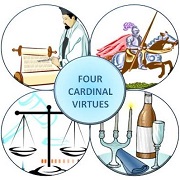
























The Six Precepts of the Church
The Precepts of the Catholic Church are a description of the absolute minimum actions required of Catholics regarding the Church
for living an authentic Catholic life.
1. To go to Mass and refrain from servile work on Sundays and holy days of obligation
2. To observe the appointed days
of fasting and abstinence established by the Church
3.
To go to Confession at least once a year (traditionally done during Lent)4. To receive the sacrament of the Eucharist at least once a year, during the Easter Season
5. To help to provide for the needs of the Church according to one’s abilities and station in life
6. To obey the marriage
laws of the Church
Prayers Before a Crucifix
Behold, O good and most sweet Jesus,
While before Thy face I humbly kneel
before
You and pray that
You would impress upon my heart
Lively sentiments of faith, hope, and charity,
With true contrition for my sins
And
a firm purpose of amendment.
At the same time, with deep affection and sorrow
I meditate on Your five precious wounds,
Having before
mine eyes the words
Which David the prophet spoke in prophecy:
“They have pierced my hands and my feet.
I can count all my
bones.”
We adore you O Christ and
We bless you,
Because by Your Holy Cross
You have redeemed the world.
Amen.
The Seven Deadly Sins
Lust/Lechery: Treating another as a
means for physical pleasure; intense or unbridled sexual desire
Gluttony: To over-indulge and over-consume especially with food
or drink
Greed/Avarice: Unreasonable desire for riches and pursuit of material possessions
Sloth: Sorrow in regard to spiritual
growth; indifferent to ones obligations to God
Wrath/Anger: Unreasonable desire for vengeance; uncontrolled feelings of anger,
rage and hatred
Envy: Feeling sorrow at another person’s good; resentfulness towards traits or possession of another
Pride/Hubris: Inflated
sense of one’s accomplishments; dangerously corrupt selfishness
Prayer to the Holy Spirit
Holy Spirit of light and love,
You are the substantial love
Of the Father and the Son;
Hear my prayer.
Bounteous
bestower of most precious gifts,
Grant me a strong and living faith
Which makes me accept all revealed truths
And shape my conduct in
accord with them.
Give me a most confident hope
in all divine promises
Which prompts me to abandon myself
Unreservedly to you and your
guidance.
Infuse into me a love of perfect goodwill,
And act according to God’s least desires.
Make me love not only my friends
But my
enemies as well,
In imitation of Jesus Christ
Who through You offered himself
On the Cross for all people
Holy Spirit, animate, inspire,
and guide me,
And help me to be always a true follower of You.
Amen.
Way
of the Cross
Stations of the Cross
1. Pontius Pilate condemns Jesus to death
2. Jesus carries his cross
3. Jesus falls
for the first time
4. Jesus meets his mother, Mary
5. Simon of Cyrene helps Jesus carry
the cross
6. Veronica wipes the face of Jesus
7. Jesus falls for the second time
8. Jesus consoles the women of Jerusalem
9. Jesus falls for the third time
10. Jesus is stripped of
his clothing
11. Jesus is nailed to the cross
12. Jesus dies on the cross
13. Jesus is taken down
from the cross
14. Jesus is placed in the tomb
The Three Theological Virtues
Faith: is the theological virtue by which we believe in God
and believe all that he has said and revealed to us. By faith man freely commits himself to God. He seeks to know and do God's will.
Hope: is the theological virtue by which we have expectation of and desire of the kingdom of heaven and eternal life. We refrain from
despair and believe in our happiness, placing our trust in Christ. We believe that God and his love for us will always be present
in our lives.
Charity: is the theological virtue that helps us love God above all things, and love our neighbor as ourselves for the
love of God.
These virtues are bestowed upon human beings during baptism and help us grow in our relationship with God with each act we commit that exhibits one of these virtues.
The Cardinal Virtues
Prudence: the first cardinal virtue. It allows one to correctly judge what is right and wrong in a situation.
It is the virtue by which one recognizes their moral duty and the good means to accomplish it.
Justice: the second cardinal
virtue. It allows one to refrain from doing evil toward one’s neighbor, but also do what is good toward one’s neighbor. One must
respect the rights of all people, promote equity among them, and uphold the common good.
Temperance: the fourth cardinal virtue.
It is the virtue that attempts to keep one from excess, and requires the balancing of legitimate goods against one’s unreasonable
desire for them. It enables one to keep their passions and emotions under the control of reason.
Fortitude: the third cardinal
virtue. It allows us to overcome fear and to remain steady in our will in the face of obstacles, It enables one to stand firm against
and endure the hardships of life, and to remain steadfast in pursuing what is good.



